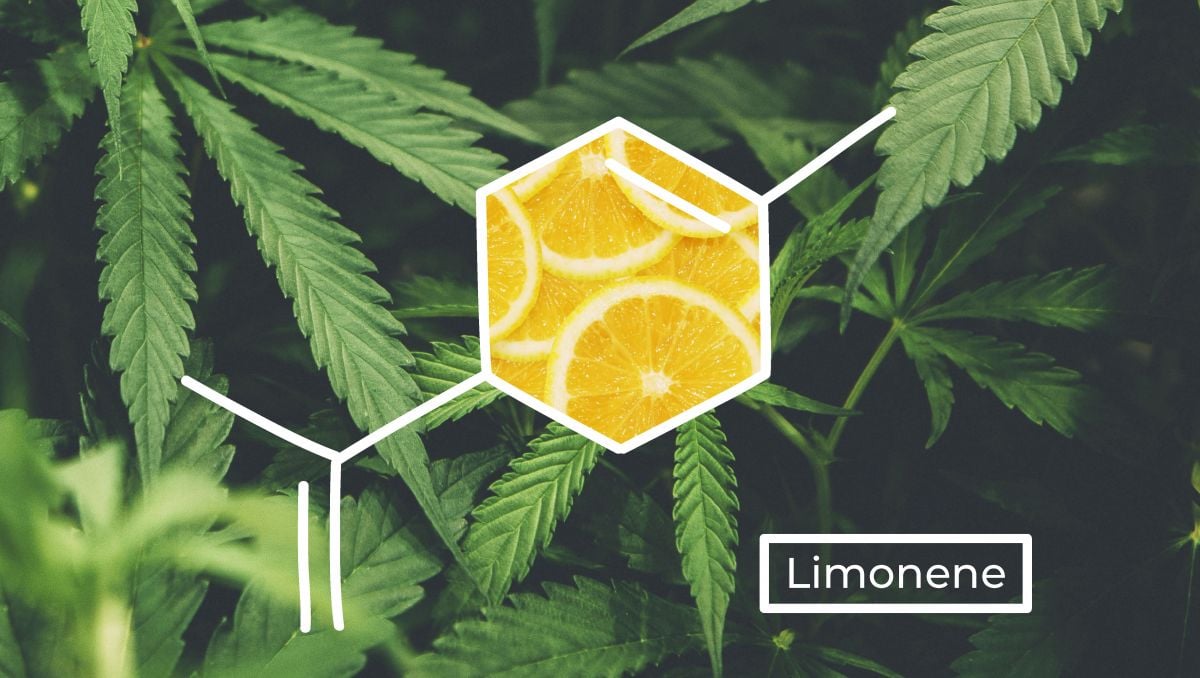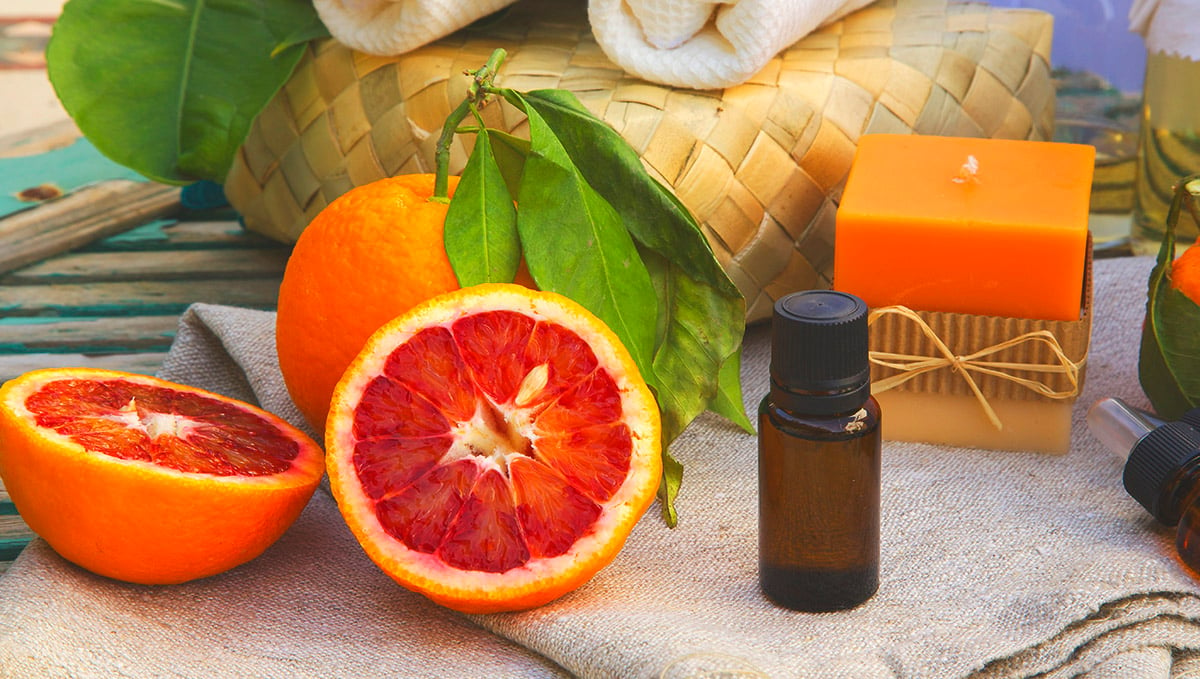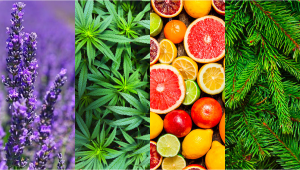Understanding Terpenes: What is Limonene?

- 1. What is limonene?
- 2. Where can you find limonene?
- 3. What are limonene's uses?
- 4. What are limonene's properties?
- 4. a. Limonene as an inflammation and pain reliever
- 4. b. Limonene for antioxidation
- 4. c. Limonene's anticancer properties
- 4. d. Limonene for boosting the mood and reducing stress
- 4. e. Limonene as an antifungal
- 5. Limonene rich strains
- 6. The bottom line
Have you ever noticed citrus, fruity flavors as you inhaled some of your favorite marijuana strains? We've all heard of strains names such as Purple Lemonade or Orange Sherbet which, as the name suggests, have clearly this citrus flavor we're talking about.
Behind this lemon or orangey taste, there's a responsible: limonene terpenes. What are terpenes, you might wonder? Well, terpenes are fragrant oils that are produced in weed buds' trichomes, the same place where other cannabinoids such as THC and CBD are produced.
Terpenes are the components in marijuana, and most of the other plants and fruits in nature too, responsible for giving each different strain and plant its own specific aroma and flavor. But most importantly, terpenes also provide each plant with a group of different properties.
If you're crazy for the sour citrus, lemon hinted flavors and aromas then read all about limonene terpenes and their benefits.

1. What Is Limonene?
As we've mentioned before, just like all of the other terpenes, limonene (lime-neen) is found in the trichomes of weed flowers. Trichomes, for those who aren't familiar with the term, are the shiny, transparent, mushroom-looking glands, where you'll find THC, CBD, and other cannabinoids as well.
And just like other common terpenes, such as pinene, for example, limonene's purpose in nature originally was to protect a plant from threatening deterring predators, or in normal words, insects.
However, when limonene is consumed in combination with other cannabinoids, these terpenes have several health benefits for human beings.
2. Where Can You Find Limonene?
Limonene, in particular, is that terpene peculiar for those tasty hints of lemon, orange, or other citrus.
Apart from being one of the most common terpenes found in cannabis, along with myrcene and pinene, you can also find big amounts of limonene in oranges, lemon, lime, and grapefruits.

Limonene terpenes are also naturally found in plants such as mint, coriander, pine, juniper, rosemary, and fennel. Let's go through the different uses of this famous terpene.
3. What Are Limonene's Uses?
Aside from adding delicious, refreshing flavors to weed buds, limonene is also used industrially for the composition of several everyday products.
For instance, can you imagine where those lemon, orange, or other citrus fragrances in your home's cleaning products or air fresheners come from? That's right, limonene is most likely part of their chemical composition. This terpene has been used as an antimicrobial even by indigenous populations.
Furthermore, limonene is often used as an organic herbicide, as a paint stripper, or as a solvent to remove oil from machinery. Medically speaking, this citrus terpene is also used as a component for making treatments for conditions such as bronchitis, gallstones, and heartburn.

Limonene terpenes found in plants such as rosemary are also used for therapeutic purposes in essential oil forms. They are often employed for muscle balms and for scalp massage for example.
Cosmetics, body creams, and fragrances may also contain some amounts of limonene in their composition, although, limonene is a skin irritant when concentrated in high volumes, which could trigger contact dermatitis, especially for those allergic to this terpene.
When we say limonene, of course, lime or lemon are the first aliments to pop into our heads. However, you are also indulging in the terpene when you have a piece of those chocolate-covered orange peels, when you have a sip of lemonade, or when you enjoy some fresh citrus-flavored ice cream.
3. What Are Limonene's Properties?
Just like other terpenes, not only does limonene aid in warding off insects from plants in the ecosystem but it is also abundant in health benefits for us human beings. Some of the properties of limonene terpenes include:
- Reducing inflammation;
- Relieving anxiety;
- Boosting the mood;
- Working as an anti-bacterial and antioxidant;
- And preventing cancers, among others.
Let's dive into limonene terpenes' properties in detail.
Limonene As An Inflammation And Pain Reliever
Two of the most established effects of limonene consumption are its anti-inflammation and analgesic properties. A few studies performed on animals, we don't stand up for these testings, have proved the effectiveness of this compound for treating inflammation and managing pain.
In the studies, results demonstrated that limonene has the capacity to reduce inflammatory markers related to osteoarthritis, a condition characterized for causing chronic inflammation.1

Another test-tube investigation, this time in human cartilage cells, found that this terpene effectively reduced nitric oxide production, which is a signaling molecule that is strongly tied to inflammation in the human body.2
Limonene For Antioxidation
For those unfamiliar with the term 'antioxidation', antioxidants are components and substances that slow down the aging of the human body, keeping us healthy, young, and unwrinkled.
More technically speaking, antioxidant compounds aid in reducing cell damage caused by unstable molecules known as free radicals. When we accumulate free radicals, it can lead to oxidative stress, thus the anti-oxidation, which in bigger rates may trigger inflammation or illness.
Research has found that limonene effectively inhibits free radicals production in some of the human cells, reducing inflammation and cellular damage that normally leads to disease.3
Limonene's Anticancer Properties
Several studies analyzing the prospect benefits of limonene in cancer prevention found successful results. For example, a study led in New Zealand found that limonene inhibited the growth of lung cancer cells in mice.4

Furthermore, limonene is also a plausible treatment for certain types of prostate cancer and could kill human colon cancer cells when used as part of a blood orange oil emulsion as well. This same emulsion could even be promising for preventing cancer.5
Nevertheless, more research is yet to be done to confirm limonene's cancer prevention properties.
Limonene For Boosting The Mood And Reducing Stress
A great property of limonene terpenes is its mood-boosting quality. Ever wondered why smoking a joint suddenly got you all happy and cheerful? It's due to the combination of compounds in your weed flowers.
"Only limited research exists on the effects of specific terpenoids. The terpenoid, D-limonene, in particular, appears likely to have antidepressant effects in humans"6
This means that consuming limonene-abundant strains could help those struggling with stress, anxiety, depression, or simply those who are having a really bad day.
Limonene As An Antifungal
Studies have also found that just like other terpenes, limonene is an effective compound for the prevention of bacteria. These citrus-scented fragrant oils aid in keeping bacteria away, not only in our human system but in the house, in cleaning products as well.

4. Limonene Rich Strains
Now that we've gone through the several benefits and properties of limonene terpenes, you might find yourself wondering what are the strains with the highest limonene concentrations.
Our Fast Buds original strain OG Kush Auto is an example of a limonene rich strain, which isn't necessarily dominant on lemon taste. This is a hybrid that blends the flavor of pine, citrus, and pungent earth.
Another strain high on limonene terpenes content is our also original strain Jack Herer Auto. This Sativa dominant strain combines hints of an earthy-sweet, smooth spiced, pepper, and citrus flavor.
5. The Bottom Line
Understanding the properties of each compound in cannabis can turn your marijuana consumption experience to the next level.
When it comes to marijuana flavors, you can turn as luxurious as a gourmet food taster. Read through each strain's technical aspects thoroughly and find out the different benefits you can get from each compound and terpenes combinations before you choose your favorite strains to consume, grow, and share.
And don't forget to comment on your favorite limonene dominant strains and your the best terpenes combinations you've tasted.
EXTERNAL REFERENCES
- "Citrus oil and MgCl2 as antibacterial and anti-inflammatory agents" Boaz Mizrahi, Lior Shapira, Abraham J. Domb, and Yael Houri-Haddad. June 2006.
- "Limonene suppresses lipopolysaccharide-induced production of nitric oxide, prostaglandin E2, and pro-inflammatory cytokines in RAW 264.7 macrophages" Weon-Jong Yoon, Nam Ho Lee, and Chang-Gu Hyun. 2010.
- "Anti-Oxidant and Anti-Melanogenic Properties of Essential Oil from Peel of Pomelo cv. Guan Xi" Wanying He, Xiaoyan Li, Ying Peng, Xiaoyan He, and Siyi Pan. Molecules, January 2019.
- "d-limonene exhibits antitumor activity by inducing autophagy and apoptosis in lung cancer" Xiao Yu, Hongyan Lin, Yu Wang, Wenwen Lv, Shuo Zhang, Ying Qian, Xiaobei Deng, Nannan Feng, Herbert Yu, and Biyun Qian. Onco Targets Ther, April 2018.
- "d -Limonene sensitizes docetaxel-induced cytotoxicity in human prostate cancer cells: Generation of reactive oxygen species and induction of apoptosis" Thangaiyan Rabi and Anupam Bishayee. Journal of Carcinogenesis, 2009.
- "The Effectiveness of Cannabis Flower for Immediate Relief from Symptoms of Depression" Xiaoxue Li, Jegason P. Diviant, Sarah S. Stith, Franco Brockelman, Keenan Keeling, Branden Hall, and Jacob M. Vigil. June 2020.












Comments